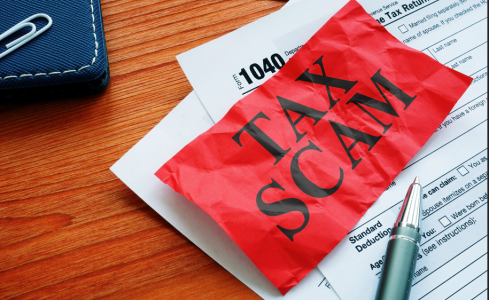Scammers target unsuspecting seniors, divert tax refunds—stay vigilant!
By
- Replies 77
Tax season in Australia is when many people look forward to their refunds from the Australian Taxation Office (ATO).
However, it's also a prime time for scammers to target unsuspecting individuals, particularly through the myGov platform.
With reports of fraudulent activities on the rise, it's crucial for Australians, especially seniors, to take steps to protect their hard-earned money.
The myGov platform is an essential tool for Australians to access various government services, including the ATO, Medicare, and Centrelink.
Unfortunately, scammers have been exploiting this centralised system during the tax season when many are eager to complete their tax returns.
The ATO reported a significant increase in impersonation scams, with 2,464 reports in June alone, marking a 48 per cent rise from the previous month.
In June 2023, 1,793 cases of impersonation scams were reported.
In the subsequent month, the ATO disclosed that scammers committing identity fraud had extracted over $557 million from July 2021 to February 2023.
Scammers typically use phishing techniques, sending text messages with links to fake myGov sites.
Once victims enter their details, scammers access their genuine myGov accounts, change contact details to prevent notifications and redirect tax refunds to their accounts.
The entire process can happen in minutes, with losses ranging from $3,000 to $8,000.
Despite the security measures in place, myGov users have questioned why two-factor authentication or passkeys are optional.
Services Australia, which runs myGov, holds only basic personal information, with sensitive details stored by linked agencies.
However, this doesn't prevent scammers from manipulating the system to divert funds.
Dr Henry Cheung, a cybersecurity expert, warns that scammers target everyone, with first-time users and older individuals being particularly vulnerable.
Scammers are opportunistic, responding to policy changes and seasonal patterns, such as the recent spike in Medicare scams following changes to bulk billing practices.
‘You can expect scams about tax from June to October,’ he said.
Scam incidents are increasing, with 601,000 scams reported in 2023 compared to 507,000 in 2022.
However, a National Anti-Scam Centre report published in April shows a decline in financial losses due to scams.
The actual number of scams is likely higher than reported.
From January to June 2024, Scamwatch received 143,106 scam reports, totalling $134.47 million in financial losses.
Phishing scams, including those targeting myGov, accounted for $9.65 million, with text messages being the most common contact method.
New South Wales experienced the highest number of scams.
The Australian federal government announced a revamp of the myGov system, replacing usernames and passwords with passkeys such as face and fingerprint recognition to fight scams.
Criminals have targeted myGov accounts, which contain sensitive data from Centrelink, the ATO, and Medicare, causing billions in losses. Read more about it here.
 Have you or someone you know been targeted by these types of scams? What measures have you taken to protect your myGov account? Share your experiences and tips in the comments below.
Have you or someone you know been targeted by these types of scams? What measures have you taken to protect your myGov account? Share your experiences and tips in the comments below.
However, it's also a prime time for scammers to target unsuspecting individuals, particularly through the myGov platform.
With reports of fraudulent activities on the rise, it's crucial for Australians, especially seniors, to take steps to protect their hard-earned money.
The myGov platform is an essential tool for Australians to access various government services, including the ATO, Medicare, and Centrelink.
Unfortunately, scammers have been exploiting this centralised system during the tax season when many are eager to complete their tax returns.
The ATO reported a significant increase in impersonation scams, with 2,464 reports in June alone, marking a 48 per cent rise from the previous month.
In June 2023, 1,793 cases of impersonation scams were reported.
In the subsequent month, the ATO disclosed that scammers committing identity fraud had extracted over $557 million from July 2021 to February 2023.
Scammers typically use phishing techniques, sending text messages with links to fake myGov sites.
Once victims enter their details, scammers access their genuine myGov accounts, change contact details to prevent notifications and redirect tax refunds to their accounts.
The entire process can happen in minutes, with losses ranging from $3,000 to $8,000.
Despite the security measures in place, myGov users have questioned why two-factor authentication or passkeys are optional.
Services Australia, which runs myGov, holds only basic personal information, with sensitive details stored by linked agencies.
However, this doesn't prevent scammers from manipulating the system to divert funds.
Dr Henry Cheung, a cybersecurity expert, warns that scammers target everyone, with first-time users and older individuals being particularly vulnerable.
Scammers are opportunistic, responding to policy changes and seasonal patterns, such as the recent spike in Medicare scams following changes to bulk billing practices.
‘You can expect scams about tax from June to October,’ he said.
Scam incidents are increasing, with 601,000 scams reported in 2023 compared to 507,000 in 2022.
However, a National Anti-Scam Centre report published in April shows a decline in financial losses due to scams.
The actual number of scams is likely higher than reported.
From January to June 2024, Scamwatch received 143,106 scam reports, totalling $134.47 million in financial losses.
Phishing scams, including those targeting myGov, accounted for $9.65 million, with text messages being the most common contact method.
New South Wales experienced the highest number of scams.
The Australian federal government announced a revamp of the myGov system, replacing usernames and passwords with passkeys such as face and fingerprint recognition to fight scams.
Criminals have targeted myGov accounts, which contain sensitive data from Centrelink, the ATO, and Medicare, causing billions in losses. Read more about it here.
Key Takeaways
- Scammers are targeting Australian taxpayers by fraudulently accessing myGov accounts during tax time, and a significant rise in tax-related scams has been reported in recent months.
- Victims are falling prey to phishing scams, which trick them into providing access details to their myGov and ATO accounts, diverting tax refunds to the scammers.
- MyGov has been questioned regarding its security features, such as the lack of compulsory two-factor authentication or passkeys, though users can enable these for additional security.
- The ATO and Services Australia advise never to click on hyperlinks sent via text or email, recommend setting up two-factor authentication and a passkey, and report any security concerns to their helpdesk. According to the National Anti-Scam Centre, scam reports are rising, but financial losses appear to be decreasing.








